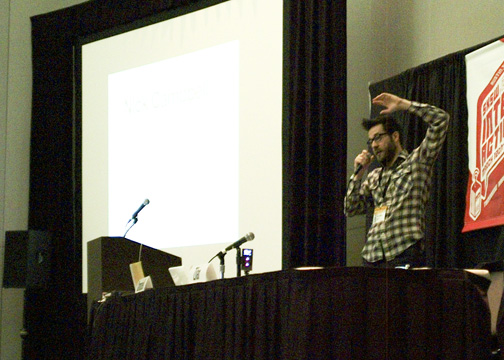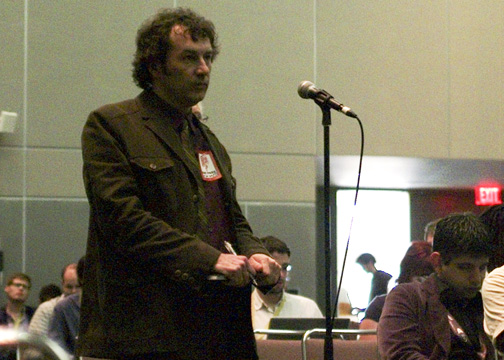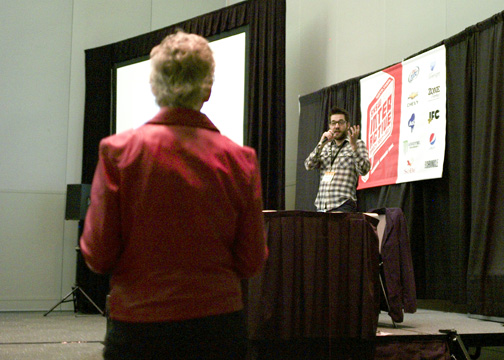“Find out what you’re passionate about,” said Nick Campbell as he opened his SXSWi panel “Be Creative, Get Paid”. It’s no revelation to hear that in order to be happy, you need to do something you are passionate about.

Passion is something that Nick Campbell possesses. Campbell brought up something that is relevant to all creatives, and that is the fact that the playing field is now completely leveled with access to information and software tools that become so easily available. I am a photographer, so many of the things Campbell said, I have already encountered. Thankfully, Campbell chose to open with a topic I understand.
Anyone can purchase a good camera and software for under $1000, watch YouTube videos and be fairly proficient with the tools that were once esoteric and available to a limited population. Now that the internet has made learning so easy, a mentor is no longer needed, and the price of education has dropped to the price of an internet connection. “Knowing the tools is not enough,” said Campbell.
So, what’s the solution? Become an expert.
No epiphany, but sometimes ideas like these need to be beat into people’s heads so they can learn and move forward.
“Learn the hard stuff,” said Campbell. Campbell explained that knowing the tools is not enough. Knowing the “how” is not enough. You need to know the “why”. In other words, knowing all the buttons in Photoshop, or in whatever design program you are using is something that anyone can learn and use. However, understanding other aspects of design, such as color theory, typography, art direction, and more is what will help define you as an expert. Campbell said that the difference that will set you apart is to be able to make “the decisions”.

Decision making, and problem solving are what make someone valuable. This is something I always tell my clients when we begin to discuss logistical issues as we plan the execution of projects. I say, “Don’t worry. That’s my job. You just tell me what you want. It’s my job to solve any problems and make it work.”
There certainly are a lot of people who can take a photograph, but knowing how to take a photograph that captures and/or communicates the right idea is a skill that takes time to achieve. This can be applied to any field, and although Campbell used photograph as an example, design is Campbell’s field. The only way to get better, according to Campbell, is to challenge yourself.
“Deadlines: make everything happen,” said Campbell. Campbell said that in order to hone your skills, give yourself small projects and deadlines so that you will create problems to solve, and a time frame in which to complete your task. So, whatever your field, if you feel like the competition is gaining on you, start assigning yourself new personal projects that will help gain some footing. Even then, being the best in your field is not enough, according to Campbell. He suggests that if you are the top dog in your area, go somewhere else where people are better and you have room to grow and learn.
Good luck! Get to work!


Permalink
From the looks of it, Campbell’s presentation may have caused some deja vu for people who were lucky enough to see Gary Vaynerchuck speak at Mass Comm Week in the fall. We seem to be hearing a lot about how, with a little internet and a lot of passion, we can go a long way in whatever field we choose.
Campbell seems to have a more rigid and technical plan for people with big goals than Vaynerchuck, based on this blog post and what I got out of the Mass Comm Week presentation. The message, however, is the same. Technology has afforded us an opportunity to succeed, as long as we have the drive and passion to work hard for it.
Permalink
I couldn’t agree more. With the internet and technology growing, everyone has the tools to become mediocre at what they love to do. However, it’s the people who dedicate a lot of time and put a lot of effort into their creativity who have the best projects and who are getting noticed.
Also, the competition out there is tough and not getting any easier. If someone puts their heart into learning and becoming an expert it shows when interviewing for jobs. I say once you find your passion learn it and learn it well.
Permalink
I would surly agree with the information presented in the article. What many people do not understand about becoming an expert is that many of us are already experts in some areas of our lives that we don’t recognize. For example a student who may have played softball or soccer for 10 years while growing up may not have played the sport in a while but if someone asked them about some facts or the methodology behind the sport, chances are they would have some type of expert advice to share.
With the creation of YouTube and other social networking sites, there has been an opening in the number of so called “experts” that are now becoming famous on the internet. Essentially the move towards more experts allows for the flow of information, thus, allowing for the creation of more experts and fields of study and everyday life expand.
Permalink
This post really hits home on several aspects of my life. Its true that anyone can buy the tools professionals use, and learn how to use them. They can call themselves professional or just do projects for themselves or friends, but there is a distinct line between real professional work and amateur work that is mimicking and trying to achieve the same status.
Being able to understand why you are good at your trade, and how everything works is worth a lot. Many amateur professionals know how to adjust their tools to make their product look or work good, but it isn’t the same as creating something that is a certain way because is was supposed to turn out exactly like the finished product.
Permalink
I liked Nick Campbell’s presentation alot. In these economic times, it’s easy for you to start doing what you really enjoy doing & be successful with it. The internet gives you a chance to show off your talents with the hope of getting paid for it.
The only problem people might have is confidence: We all possess talents in some way, shape, or form but some feel that they don’t have what it takes to go out on their own. That its silly to think outside the box & start the nex internet revolution. And you can’t blame the people themselves for this. Society & traditional media taught out grandparents & parents that you go to grade school, go to college, get a job with a company, work for 20 years, & retire. What talents we do possess get suppressed & we begin to feel “talentless.” Thankfully, our generation is trying to fight that mold & thanks to the internet we can start to express our talents freely. Hopefully we can show our children that having a talent does mean something so that we can have a more creative future.
Permalink
I was very happy with Nick’s discussion of “the hard stuff” being design, color theory, & drawing as key elements in hiring and successful employment. Our students at AI Austin are being taught the foundations of design and composition, color theory, life and observational drawing as well as learning technical skills. That’s my back in the picture. Hire my students – they have knowledge and skills in that hard stuff! If you have a paid internship for a student who can color theorize with knowledge and confidence call the Art Institute to post your position. The person in charge of student placement is Diane Rouda (512) 691-1721